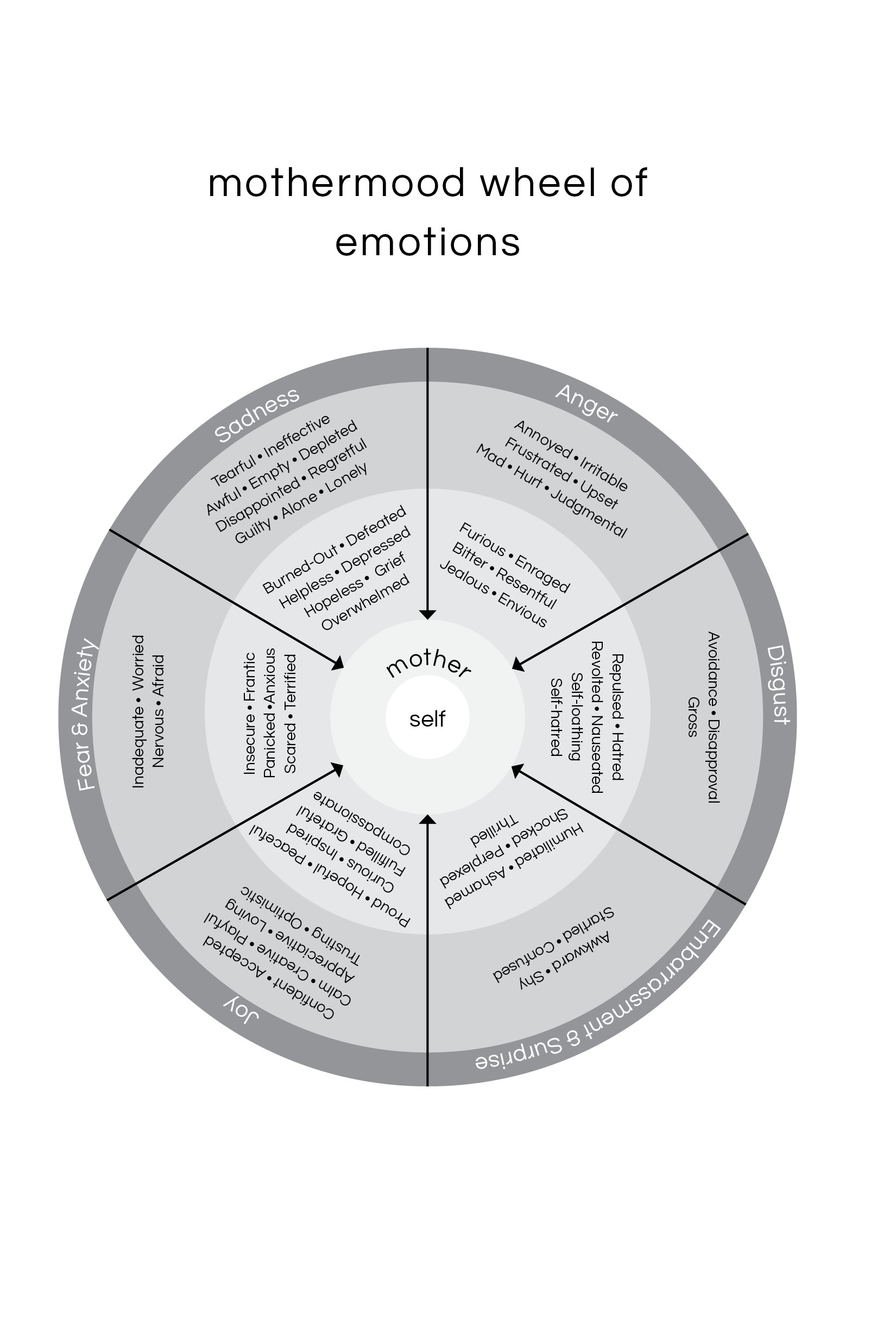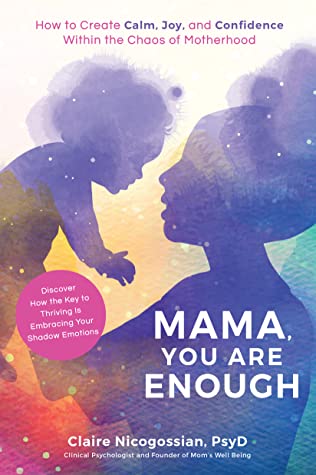I can think of no role in life that compares to the emotional experience of motherhood. Before becoming a mother, with two advanced degrees in mental health and psychological functioning, I thought I knew a lot about emotional states impacting thoughts, behaviors, and experiences in a person’s life. Then I became a mother, and all that prior experience and education no longer applied. Becoming a mother creates a heightened awareness of the intensity of human emotions. Think back to the time before you were a mom. Think about the feelings or thoughts you had. Now think about becoming a mother. Wouldn’t you agree that you’ve felt more emotions and have had more thoughts and experiences that intensified what it means to be human in the role as a mother?
Motherhood is an ever-evolving journey, one in which we learn about ourselves via nurturing and caring for our children. Motherhood is not an isolated experience built on one moment or event; it’s a process of self-discovery and understanding that provides an opportunity to experience astounding love, compassion, and understanding for ourselves, our child, and our partner. Motherhood is sacred. But it’s not immune to the ups and downs of life or to life’s emotions—happiness and anger and every emotion in between. Motherhood isn’t one experience; it’s all of these things. And like anything complete, there will be moments (often many moments) that force us to stop, pay attention, and refocus.
Being a mother involves being a caregiver, protector, nurturer, teacher, nurse, counselor, chef, chauffeur, and advocate. With so many roles, motherhood can feel tiring, demanding, and overwhelming. Of course, motherhood is a lovely, inspiring, and divine gift. Motherhood can be and is not limited to being:
divine and superficial
a blessing and a strain
joyful and enraging
peaceful and chaotic
happy and depressing
connected and lonely
confident and uncertain
a source of love and disdain
And in these extremes, there is a range from mild to severe emotions that make up a continuum of emotional experiences in motherhood. But all of these contrasts make up the whole of motherhood, just like a beautiful impressionist painting.
Motherhood is a series of shadow moments and lovely moments; dabs of paint both light and dark. Focusing on only one part of motherhood—for example, the shadow moments with your child—takes away the perspective of viewing motherhood as a whole, which is beautiful and unique.
To be a mother is a sacred calling, not given to everyone. And the surprising thing about motherhood is we can never truly anticipate the role of a lifetime until we are in the position of nurturing a beautiful soul. And that’s why it’s critical to understand the shadow side of mothering. Because when we learn of a baby or child coming into our lives, whether we planned and worked for our child or they came as a surprise, we are forever changed.
When I was pregnant with my babies, I’d have thoughts and dreams of what they would look like and who they’d become. I’d imagine what it would be like to feel their hands hold mine or their arms hug me. I didn’t think about how they wouldn’t sleep for days, refuse to eat, or be difficult to soothe. I didn’t anticipate the fear and helplessness I’d feel when they were sick and I couldn’t do anything to make them feel better as they cried in pain. I didn’t imagine how tough it could be to find time to shower, eat a meal, or spend time with my husband and friends.
And when I was pregnant, I could hardly imagine a day when my child would be disrespectful or lie, much less hurt a peer, a sibling, or me with an unkind word. I also never dreamed about the time my teenagers would roll their eyes at me, talk back, and blatantly ignore a request made of them. One of the most surprising things about motherhood is you can never fully know what to expect or how to manage the role until you’re experiencing it. Which is why I believe mamas need support and guidance to understand the range of emotions experienced in motherhood, from the positive ones we expect (like love, joy, gratitude, awe, and contentment) to the ones I refer to as shadow emotions (like sadness, fear, disgust, anger, and embarrassment) that can catch us off guard and cast a shadow over the joys of mothering.
Understanding Shadow Emotions in Motherhood
We live in a world where it’s natural to put things in categories: good or bad, healthy or unhealthy, strong or weak, happy or sad, positive and negative. Placing things in categories can be helpful at times, but often, doing so is a rigid and inflexible way of looking at things. Describing situations or experiences in such extremes is quick and streamlined but a tad judgmental, decreasing an opportunity to understand something and yourself in more depth and with curiosity. I prefer to see things on a continuum, in a range of variations, and emotions are a perfect example.
Emotions are often labeled as positive or negative; the positive ones bring us joy, happiness, and contentment, and they’re the ones we strive to feel. On the other hand, the negative emotions are the ones we want to avoid, push away, ignore, diminish, and remove from our experiences. But I see avoiding or suppressing our emotions as problematic. Our desire not to experience the “negative” emotions prevents us from understanding ourselves on a deeper level. Here is what I know from two decades of being a therapist: No feeling or emotion is negative or bad. All emotions and feelings—even shadow emotions—are simply pieces of information about what we are experiencing or responding to in any given moment. Just like actual shadows created by clouds on a sunny day, emotions are neither good nor bad—they are simply part of life.
Shadow emotions are the challenging emotions and feelings we experience, the ones that push us outside of our comfort zone or feel unpleasant. Experiencing a shadow emotion creates an opportunity to pause and check in with ourselves as to what we are experiencing. Instead of reacting without intention or awareness, when we experience a shadow emotion, we can pause, take a compassionate and curious approach to understand what we are feeling, and use skills and strategies as outlined in this book, deciding on how we’d like to respond. Managing shadow emotions is an act of self-care.
Putting this in greater context, if you are a mother of an older child, I’m sure you have heard them say, “I’m afraid of the dark.” And what do we usually say to this child? “There is nothing to be scared of; you are safe, and I’m right here.” If the child persists, perhaps you offer a night-light or rub their back and stroke their head and hair. Maybe you sing a lullaby or give a hug and kiss for reassurance. Perhaps, if the child continues to need more because of their fear, you listen to them and ask what you can do to help. Maybe they’ll request that you check under the bed, close the closet door, or give them a cherished stuffed animal, all gestures that bring comfort to them.
Now think for a moment about when you were scared of the dark. But this time, the darkness is not at night. (I know plenty of moms who relish the hours in the evening when children are asleep, the house is quiet, and they finally have a moment to themselves!) I’m talking about the darkness of having felt afraid or judged when you experienced a shadow emotion. Perhaps it was a time when you felt overwhelmed, exhausted, or stressed, and you could barely handle all of the responsibilities of your life. Or maybe it was a moment of loving your child so much but feeling so unfulfilled as a person. Or those moments in motherhood when you lose your temper with your child and say hurtful things out of frustration, and while your child accepts your apology, you lament in the guilt for having lost your temper and the fear you have permanently damaged your child with your rage.
As a mother and a psychologist, I can say this: You can experience dark moments and shadow emotions in motherhood and still be grateful for your child, adore being a mother, and continue to be a good mother. Motherhood is seldom defined in one moment. It is a series of events and years of nurturing, protecting, teaching, and guiding your child through development and life. By bringing light and awareness to the shadow emotions in motherhood, we can make changes and improve not only our children’s lives but also our own lives. So while you may feel an emotion, it doesn’t mean you have to dwell on that emotion, it doesn’t mean you’re defined by the emotions you feel, or that you have to act on the emotion. Instead, you can be informed and pause for a moment, reflect and choose how to respond. This is the core component of managing emotions: choosing a healthy way to respond instead of an unhealthy way of reacting.
In my book, Mama, You Are Enough, five categories of shadow emotions are explored: (1) sadness, (2) fear, (3) anger, (4) embarrassment, and (5) disgust.
Because emotions exist on a continuum, within each broad shadow emotion you will read about a range of specific feelings in varying intensities, from mild and moderate feelings to more intense and severe emotional reactions. You can see on the MotherMood Wheel of Emotions how I approach our main emotions, including both the shadow emotions and joy, broken down into their more specific and intense feelings.

Some of the feelings will be familiar to you, and others you may seldom experience, if you experience them at all. And that is okay. Remember, there is no judgment; rather, you must simply open up to awareness and understanding about what you experience.
Ten Truths about Emotions and Feelings in Motherhood
1. Emotions and feelings are neither good nor bad.
2. An emotion or feeling does not define you or your abilities as a mother.
3. Experiencing an emotion or feeling doesn’t mean you have to act on it.
4. Feelings and emotions provide opportunities for awareness and reflection, which leads to self-growth.
5. Emotions and feelings can be experienced along a continuum from mild, to moderate, to intense, to severe.
6. Emotional states can be temporary, linger for short amounts of time as well as be more lasting and pervasive states of being.
7. Judging an emotional state with phrases like, “I shouldn’t feel this” or “I wish I didn’t feel this,” blocks self-compassion and understanding and delays an opportunity for personal growth.
8. Emotions and feelings are wise parts of ourselves; when we do not acknowledge or pay attention to them, they will find a way to be seen, whether we want them to or not.
9. Even when it’s challenging, showing compassion for our emotions and feelings creates opportunities for growth and healing.
10. Taking care of your emotional state is a crucial component of thriving in motherhood.
Over my years of clinical experience, I developed the above ten truths that, when deeply understood, can lead to powerful transformation in your journey through the emotions of motherhood. I hope that they inspire you to begin your own journey to recognizing that Mama, you are enough.

Follow us here and subscribe here for all the latest news on how you can keep Thriving.
Stay up to date or catch-up on all our podcasts with Arianna Huffington here.


